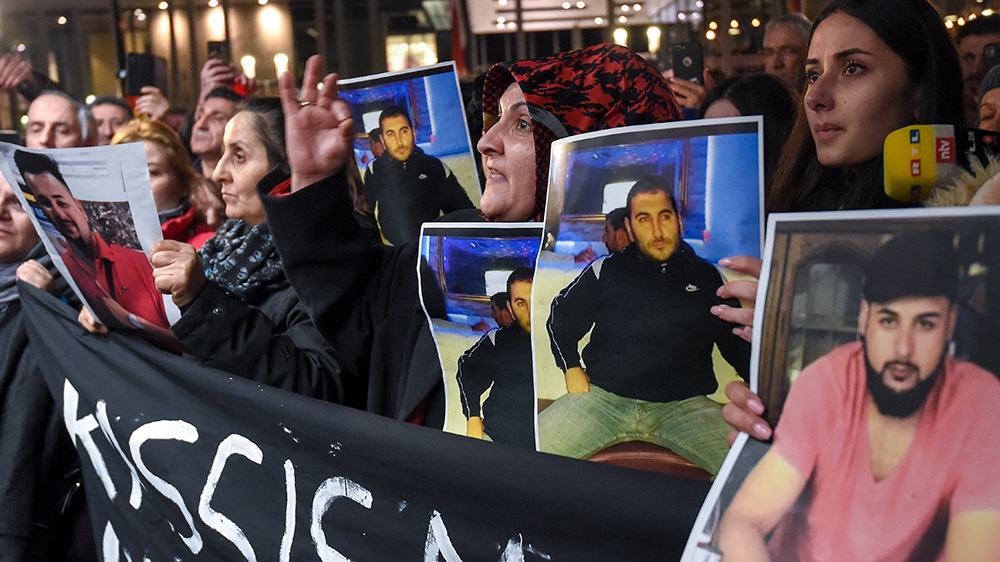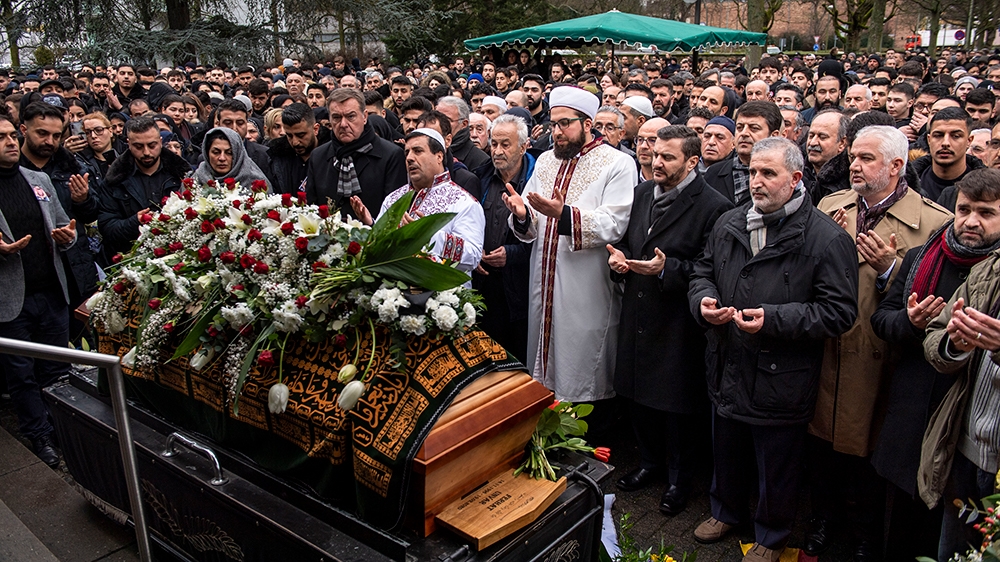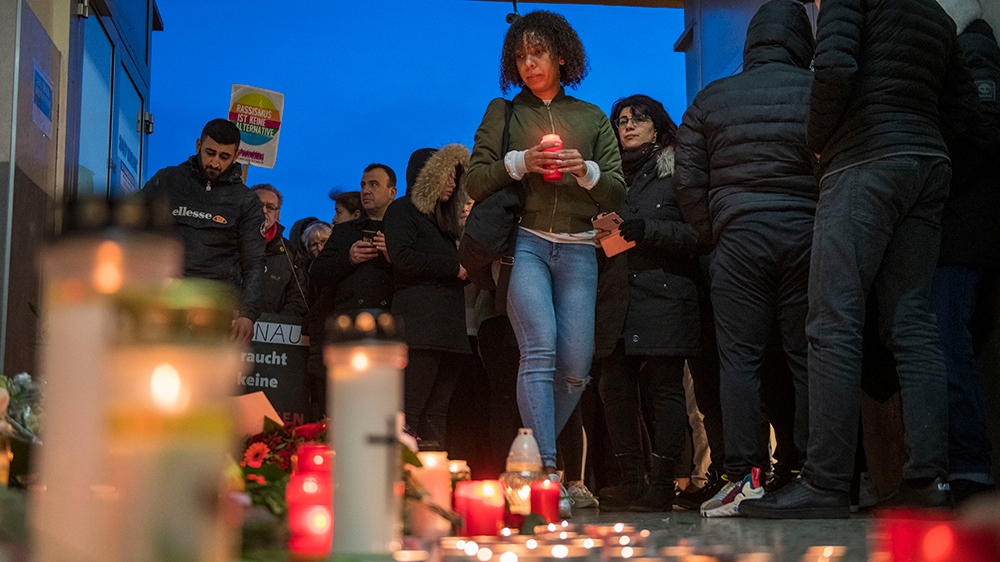Hanau attack mourners: ‘Germany must deal with racism, far right’
Community draws link between racist violence and targeted raids on shisha bars that attract ethnic minority customers.

Berlin, Germany – It has been an exhausting three months for Seda Ardal and others who lost loved ones on February 19, in the far-right attack on a shisha bar and a sports cafe in Hanau, central Germany.
From media interviews to lawyer meetings, those affected have been trying to keep the memory of the victims alive, and pressure on politicians high.
Keep reading
list of 4 itemsGerman blue-chips warn of ‘extremist’ threat before EU elections
Germany’s Scholz calls for unity against far-right after MEP seriously hurt
‘No turning back’: Carnation Revolution divides Portugal again, 50 years on
Nine people died in the attack by the alleged perpetrator, 43-year-old Tobias Rathjen, who went on to kill himself and his mother.
German authorities later found a confession letter expressing racist and far-right views.

Ardal is among a group of mourners marking the three-month anniversary on Tuesday, at a community-funded space set up near the shisha bar in the wake of the killings.
She lost someone close in the attack but requested Al Jazeera not to name who out of respect for all the families in mourning, so her loss does not appear any more important.
“It’s been very hard for us but we have just tried to be there for each other, be strong and keep going,” she told Al Jazeera. “The space is playing a very big role because family and friends have been sharing their feelings with people who know exactly what they’re going through.”
The attacks came amid a so-called “clan debate” that had been playing out in Germany’s political and media landscapes for years.
The anti-immigrant Alternative For Germany party (AfD) first spoke about “clans” – criminal families with a migration background – back in 2017, when they called for citizenship to be revoked if migrants were found to belong to one.
The issue has since been taken up by politicians from other parties, followed by raids of hundreds of shisha bars in at least three parts of the country.

Authorities say the raids are intended to crack down on crime, as they claim to uncover untaxed shisha tobacco and black money, among other violations.
Critics, however, argue that the raids and the accompanying media coverage feed into a negative portrayal of shisha bar culture and those who go there.
“The raids are disproportionate, costly and stigmatising,” Jorinde Schulz, a member of the Die Linke (the Left Party), told Al Jazeera.
While there are no official statistics on how many shisha bars have been raided, there were 382 raids on various establishments, including shisha bars and betting shops, across the capital Berlin last year.
Residents in Neukolln, a district in southeast Berlin which is home to a significant ethnic minority and migrant population, told Al Jazeera that shisha bars in their area have been targeted, with little evidence of large-scale criminal activity emerging.
Official documents show that in many of the Neukolln raids, only small amounts of drugs or smaller offences such as underaged bar-goers, were recorded.
We are calling on authorities to focus on the intensity of the problem and deal with the racism and far-right elements within politics, the police and other institutions.
Schulz, who lives in Neukolln, said: “While we understand there are some structures of organised crime that need to be dealt with, we are questioning this narrative that any shisha bar is a hotspot for criminal activity. The extent of these crimes and the way it’s been talked about by politicians and parts of the media has been exaggerated and demonising, and has resulted in massive raids – in some cases with more than 300 officers – at many shisha bars and the police harassment of owners and customers.”
Schulz and other locals, including those who have been caught up in the raids, recently formed an initiative called Kein Generalverdacht (No General Suspicion) to raise awareness about the effect of the raids, and to put pressure on authorities to change their strategy.
It is a call, they say, that has grown more urgent since the killings in Hanau.
“What happened in Hanau was shocking,” Schulz said. “We hadn’t thought something like this would happen but we were also not really surprised that it did. We have been heavily criticised for drawing the connection but we now know that in the context of right-wing terrorism it’s not just about who did it, it’s also about what images of certain spaces or certain communities are painted.
“Racist campaigns like the ‘clan debate’ mark potential targets for attacks. So for us, the connection is very clear.”
They say the raids affect local business owners economically and represent an attack on social spaces for people who may feel uncomfortable or unwelcome in other places such as clubs and bars.

As Ardal says: “I have been going to shisha bars since I was a teenager. It’s a space where I feel connected to my culture and the people who go there are either of the same cultural background as me, or if they’re not, we know they are people who accept us and appreciate our heritage. But there are a lot of prejudices against shisha bar culture and it’s based on fear.
“They criminalise these places because they have no idea what is going on.”
Despite the growing calls to change their strategy, authorities told Al Jazeera that the measures will continue.
A Berlin Interior Ministry spokesperson said: “The high number of legal violations found during the controls [raids] shows that the phenomenon can only be countered by maintaining the control pressure and consistently punishing even minor violations in order to enforce compliance with the legal system and social rules.”
Continuities of violence
On May 8, as Berlin marked 75 years since the defeat of the Nazis with a one-off holiday, those who continue to be affected by far-right violence gathered for a socially-distanced protest in Neukolln under the banner “from Moria to Hanau”.
Other recent far-right attacks in Germany include the October 2019 killings of two people near a synagogue in west Germany, and the June 2019 murder of a pro-refugee politician at his home in Wolfhagen.
At the May 8 event, authorities were accused of failing to properly investigate the National Socialist Underground (NSU) killings – in which nine people with minority backgrounds were murdered by neo-Nazis in the 2000s – amid allegations of structural racism.
International Women’s Space, a Berlin-based feminist migrant and refugee rights group, was one of the groups involved in the demonstration.
A spokeswoman told Al Jazeera: “What we see from the NSU killings to Hanau is a continuity of racist violence and the failure of the state to look at the wider networks. Authorities treat right-wing violence as something which is coming from right-wing extreme organisations. That’s not true, it’s also coming from the middle of society. And it is not only based in right-wing ideology, but also in racism and migration policy.”

Those remembering the Hanau victims say that the country must learn lessons from its troubled past.
“The big issue with this ‘clan debate’ is that it’s been actively pushed in order to legitimise some political measures, for example, being able to withdraw citizenship from people or being able to deport people,” Schulz, the Neukolln resident, said.
“Taking away people’s citizenship is one of the first steps the Nazis took against the Jews, so we know what this kind of politics leads to.”
Ardal added: “We are calling on authorities to focus on the intensity of the problem and deal with the racism and far-right elements within politics, the police and other institutions. We always felt Hanau was safe because it is a city full of migrants and minorities.
“We were shook up at first, but now we don’t want to hide and live in fear, and will still go to shisha bars. How can all this be happening in a country that has a history like Germany’s? Germany should be ashamed of its history and it’s really not acting like it is.”
